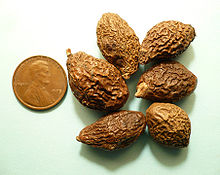bio.wikisort.org - Plant
Scaphium affine[1] is a tree species in the family Malvaceae, subfamily Sterculioideae (previously placed in the Sterculiaceae and synonyms include Sterculia lychnophora Hance[2]). It is native to mainland Southeast Asia and no subspecies are listed in the Catalogue of Life.[3]
| Scaphium affine | |
|---|---|
 | |
| Dried seeds for use in Vietnamese cuisine (known as hạt đười ươi) | |
| Scientific classification | |
| Kingdom: | Plantae |
| Clade: | Tracheophytes |
| Clade: | Angiosperms |
| Clade: | Eudicots |
| Clade: | Rosids |
| Order: | Malvales |
| Family: | Malvaceae |
| Genus: | Scaphium |
| Species: | S. affine |
| Binomial name | |
| Scaphium affine (Mast.) Pierre | |
| Synonyms | |
|
Sterculia lychnophora Hance | |
Scaphium affine has culinary and traditional medicinal uses. In English it is known as malva nut tree, or sometimes "Taiwan sweet gum tree", although these names also apply to the similar Scaphium macropodum (Vietnamese: ươi).
Description
The tree grows to a height of 25–30 m. The dried seeds are the size of an adult's fingertip; they are brown and have coarse skin.
Common names for the malva nut
- Lao: ໝາກຈອງ /mȁːk cɔːŋ/
- Chinese: 胖大海; pinyin: pàngdàhǎi; lit. 'fat ocean'
- Vietnamese: hạt lười ươi; đười ươi; hột lười ươi
- Khmer: សំរង, lit. '(មិនមែនសំរ៉ង) ឈ្មោះឈើមួយប្រភេទ ផ្លែទុំស្ងួត បើត្រាំទឹករីកស្គុយ សាច់ស្កាតៗ ប្រើលាយស្ករបរិភោគជាចំណីត្រជាក់' /sɑmraoŋ/.
- Marathi: निरंजन फळ Niranjan Phal /NiRṃJN PhL/ (IAST)
- Hindi: मालवा फल Malva Phal /MāLVā PhL/ (IAST)
- Thai: ลูกสำรอง, หมากจอง, พุงทะลาย
- Malay: Kembang Semangkuk
- Tamil: அதிராம்பட்டினம், தமிழ்நாடு, உம்மாசலிமா கொட்டை
Culinary and medicinal use of the nuts
The seeds of this species and S. macropodum are used in traditional Indian medicine Ayurveda as well as traditional Chinese medicine as a "coolant", for gastrointestinal disorders, and for soothing the throat. As a result, it is collected as a major non-timber forest product in Laos, and is that country's second export crop after coffee. Sterculinine is a bio-active alkaloid found in this species.
Malva nuts in soups and desserts

The flesh surrounding the dried seeds swells to eight times its original volume when soaked in water, forming an irregularly shaped, reddish gelatinous mass. After being soaked and the seed kernel removed, the flesh is mixed with granulated white sugar, ice, and soaked basil seeds, and drunk as a cooling drink in Vietnam, Thailand, Laos and Cambodia. They are sometimes also used, along with other ingredients, in sweet, cool soups similar to the Chinese tong sui.
In China, malva nut is used in tea as well by mixing with other ingredients such as sugar candy, red date, haw, liquorice, chrysanthemum flower, lilyturfroot, and jasmine tea. The advantage of such tea is believed to reduce the "hotness" of the body, and nurture the body.
Malva nuts in traditional Chinese medicine
According to Chinese medicine, the use of "Pang Da Hai" can remove heat from the lung, cure sore throats, counteract toxicity, and moisten the bowels. Specific symptoms treated include: hoarseness of voice, dry cough or productive cough with yellow sticky sputum, sore, dry throat due to heat in the lung and constipation with headache and bloodshot eyes. Consume malva nut by adding one or two nuts to a large cup of boiling water and consume the liquid. Typically, in traditional Chinese medicine, malva nut would be part of a larger formula of herbs designed to address a person's condition.
Although it possesses medicinal properties, care must be taken with its consumption. Avoid boiling more than 3 seeds per drink. Over-consumption symptoms include white watery phlegm, nausea, coughing, and swollen tongue. People with frequent digestion problems and abdominal pain or diarrhea should avoid it entirely.
References
- Pierre, 1889 In: Fl. For. Cochinch. Fasc. 13 (1889) sub t. 193-95, in text.
- The Plant List Sterculia lychnophora Hance.
- Roskov Y.; Kunze T.; Orrell T.; Abucay L.; Paglinawan L.; Culham A.; Bailly N.; Kirk P.; Bourgoin T.; Baillargeon G.; Decock W.; De Wever A. (2014). Didžiulis V. (ed.). "Species 2000 & ITIS Catalogue of Life: 2014 Annual Checklist". Species 2000: Reading, UK. Retrieved 26 May 2014.
External links
 Media related to Scaphium affine at Wikimedia Commons
Media related to Scaphium affine at Wikimedia Commons- Malva nut on the Lao NTFP wiki
- Detailed reference in the Lao NTFP network's "Tree tenure and forest management in Southern Laos" (pgs 4~14)
Другой контент может иметь иную лицензию. Перед использованием материалов сайта WikiSort.org внимательно изучите правила лицензирования конкретных элементов наполнения сайта.
WikiSort.org - проект по пересортировке и дополнению контента Википедии